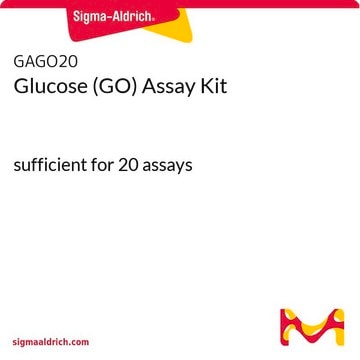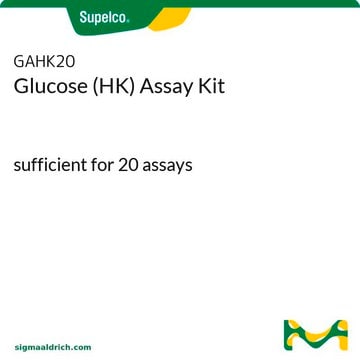MAK021
High Sensitivity Glucose-6-Phosphate Assay Kit
sufficient for 100 fluorometric tests
Sign Into View Organizational & Contract Pricing
All Photos(2)
About This Item
Recommended Products
usage
sufficient for 100 fluorometric tests
detection method
fluorometric
relevant disease(s)
cancer; hematological disorder
storage temp.
−20°C
General description
Glucose 6-phosphate (G6P) is a key metabolic intermediate that enters either metabolic pathways or storage. G6P is generated when glucose is phosphorylated by hexokinase or glucokinase or by the conversion of glucose-1-phosphate by phosphoglucomutase during glycogenolysis. G6P lies at the beginning of both glycolysis and the pentose phosphate pathways. It also can be stored as glycogen when blood glucose levels are high. G6P is utilized by Glucose-6-phosphate dehydrogenase to generate reducing equivalents in the form of NADPH. This is particularly important in red blood cells where a G6PDH deficiency leads to hemolytic anemia. The Glucose-6-phosphate Assay Kit is a simple, sensitive and rapid means of quantifying G6P in a variety of samples.
Features and Benefits
Compatible with high-throughput handling systems.
Suitability
Suitable for quantifying Glucose-6-Phosphate concentrations in a variety of samples.
Principle
Glucose-6-phosphate concentration is by a enzyme assay, which results in a fluorometric (λex = 535 nm/λem = 587 nm) product, proportional to the G6P present. Typical sensitivities of detection for this kit are between 100-500 pmoles. The Glucose-6-Phosphate Assay Kit is much more sensitive than the Glucose-6-Phosphate Colorimetric Assay Kit (MAK014) and is suitable for samples with low concentrations of glucose-6-phosphate.
replaced by
Product No.
Description
Pricing
Storage Class
10 - Combustible liquids
wgk_germany
WGK 1
flash_point_f
188.6 °F - closed cup
flash_point_c
87 °C - closed cup
Certificates of Analysis (COA)
Search for Certificates of Analysis (COA) by entering the products Lot/Batch Number. Lot and Batch Numbers can be found on a product’s label following the words ‘Lot’ or ‘Batch’.
Already Own This Product?
Find documentation for the products that you have recently purchased in the Document Library.
Glucose-6-phosphate dehydrogenase, NADPH, and cell survival.
Robert C S.
IUBMB Life, 64(5), 362-369 (2012)
Role of the liver in the control
of carbohydrate and lipid homeostasis
of carbohydrate and lipid homeostasis
Postic C, et al.
Diabete & Metabolisme, 30, 398-408 (2004)
Glucose 6-phosphate dehydrogenase deficiency: from genotype to phenotype.
Lucio L.
The Hematology Journal : The Official Journal of the European Haematology Association / EHA, 1303-1306 (2006)
Iain J Abbott et al.
Journal of microbiological methods, 171, 105861-105861 (2020-02-09)
The impact of the bladder environment on fosfomycin activity and treatment response is uncertain. Standard laboratory media does not reflect the biomatrix of urine, where limited nutritional factors are important for growth and antimicrobial kill rates. We compared fosfomycin activity
Alexander Rockenbach et al.
Metabolites, 9(10) (2019-10-03)
Exploring the dynamic behavior of cellular metabolism requires a standard laboratory method that guarantees rapid sampling and extraction of the cellular content. We propose a versatile sampling technique applicable to cells with different cell wall and cell membrane properties. The
Articles
Warburg effect enhances glucose to lactate conversion in tumor cells, regardless of oxygen levels; impacting cancer metabolism since 1924.
Our team of scientists has experience in all areas of research including Life Science, Material Science, Chemical Synthesis, Chromatography, Analytical and many others.
Contact Technical Service

